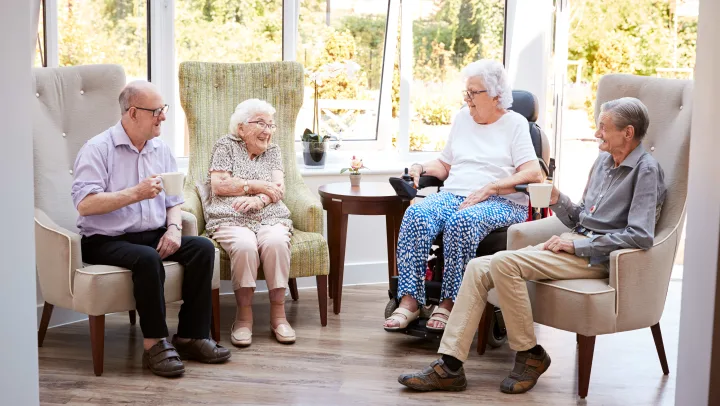The Function of Assisted Staying In Providing Specialized Take Care Of Mental Deterioration Patients
The arrangement of specialized treatment for dementia people within assisted living centers is increasingly acknowledged as an essential component of effective mental deterioration management. These atmospheres are designed to resolve the unique cognitive and emotional difficulties dealt with by people with mental deterioration, offering tailored support that promotes safety and well-being. By integrating structured routines and engaging activities, assisted living can reduce feelings of isolation while enhancing overall high quality of life. The efficiency of these programs typically hinges on different elements, including staff training and family involvement, prompting a more detailed examination of just how these components interact to optimize care outcomes.
Comprehending Dementia Care Demands
Comprehending the treatment needs of people with dementia is crucial for giving effective assistance and enhancing their lifestyle. Dementia is a dynamic neurological condition that affects cognitive features such as memory, reasoning, and interaction. As a result, people with mental deterioration frequently call for assistance with everyday tasks, customized treatment strategies, and emotional assistance.
Effective dementia treatment entails recognizing the special obstacles faced by each individual. This consists of understanding the stages of mental deterioration, which can vary from mild cognitive disability to innovative stages requiring detailed aid. Care needs may incorporate support in handling day-to-day routines, medicine adherence, and preserving social communications to prevent isolation.
In addition, sensory excitement and familiar environments can dramatically enhance the well-being of individuals with dementia. Caregivers should be trained to determine behavioral modifications and use approaches customized per person's preferences and past experiences. Techniques such as validation therapy and reminiscence can help interact properly and cultivate a sense of security.
Inevitably, successfully attending to the treatment demands of people with mental deterioration requires a compassionate method, ongoing training for caregivers, and a commitment to maintaining self-respect and regard throughout the caregiving procedure.
Advantages of Assisted Living

Assisted living promotes social communication amongst residents, promoting a feeling of area and belonging. Engaging with peers can ease sensations of isolation, which are common in those living with mental deterioration.
Furthermore, several nursing home use support with everyday tasks, such as medication administration, bathing, and dish preparation. This assistance permits homeowners to maintain their self-reliance while ensuring their health and health are prioritized. Eventually, assisted living works as a valuable resource, stabilizing treatment and freedom for individuals with mental deterioration and their families.

Specialized Programs and Tasks
Furthermore, art and music therapy play significant roles in promoting creativity and emotional expression (Assisted Living). Engaging locals in paint, crafting, or music sessions can give restorative benefits, aiding to decrease anxiousness and enhance state of mind. Exercises, such as mild exercises and dancing sessions, are also important, as they promote mobility and physical health and wellness while motivating social communication amongst locals
Structured day-to-day routines are often developed to provide a sense of security and predictability for individuals with dementia. These regimens can consist of arranged dish times, team activities, and individualized care plans that provide to individual rate of interests and capacities. By creating an enriching setting filled with tailored tasks, aided living facilities not only improve the top quality of life for dementia clients however additionally foster a sense of neighborhood and belonging.
Educated Team and Support
In addition, qualified team are geared up to carry out personalized care strategies tailored per resident's preferences and capabilities. This personalized strategy fosters a sense of autonomy and dignity, enabling homeowners to involve in meaningful activities that improve their high quality of life. The team likewise play an important function in keeping track of wellness and health, promptly identifying any modifications in condition that may need medical interest.
Along with guide care, qualified personnel supply psychological assistance to citizens, assisting to relieve sensations of complication and anxiety that often accompany dementia. Their thoughtful strategy develops a caring atmosphere where citizens feel valued and understood - Assisted Living. Ultimately, the competence and commitment of qualified staff are essential in providing extensive treatment that meets the intricate demands of individuals dealing with mental deterioration in assisted living settings
Family Members Involvement and Resources
Family participation plays a considerable role in the treatment of individuals with mental deterioration in assisted living centers. Engaging member of the family in the treatment process not only improves the psychological wellness of the resident but likewise fosters a joint environment where treatment directory strategies can be customized to private demands. Families can offer useful insights into the choices, history, and behaviors of their loved ones, which can educate caretakers and bring about more personalized treatment methods.
Moreover, helped living facilities often provide sources for family members, such as support system and instructional workshops. These sources can help households understand dementia, boost interaction strategies, and establish coping devices. Participation in these programs can encourage relative, equipping them with the tools necessary to sustain their loved ones properly.
Furthermore, normal communication in between family members and personnel is crucial. This continuous discussion allows households to remain educated about their liked one's development and any kind of modifications in treatment strategies. Inevitably, a solid partnership between households and aided living centers cultivates an atmosphere of depend on and understanding, ensuring that people with mental deterioration receive the specialized care they should have while keeping their household connections.
Final Thought
To conclude, assisted living centers play a vital function in attending to the special requirements of dementia people through customized care and assistance. By promoting risk-free settings, advertising social interaction, and applying structured routines, these centers enhance the overall health of citizens. The involvement of trained personnel and families further improves the treatment experience, making certain that specific choices and backgrounds are respected. Eventually, assisted living supplies essential resources that substantially improve the quality of life for those living with dementia.
Comments on “Find expert Memory Care staff providing personalized senior care.”